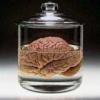[quote name='mikeman' timestamp='1311620158' post='4840126']
What are you talking about? You indeed stated 'my vacuum cleaner hunger is not different than mine' without proving it. You continuously ask from people to prove their opinions while you get to make broad statements without even the hint of an objective evidence.
My assertion is that my sensing the need for something and then reacting to it by seeking it out is no different from my vacuum cleaner doing the same. How exactly do you recommend I prove that? Can I list all aspects and details of human hunger and exhaustively compare each one to my vacuum cleaner's hunger? No, I cannot. To prove that they are NOT different, however, is very easy. One need only list one feature that makes the two qualitatively different.
My assertion does not require any extraordinary evidence because it's not an extraordinary claim. My assertion does not necessitate the existence of a supernatural "soul". My assertion is simply what we all observe. That I receive a "hunger" signal and then seek food, that a lion does the same thing, a slug does the same thing, and that my vacuum does the same thing when it needs power.
It is the claim that they are different that requires some sort of evidence, because it is an assertion that something exists that makes them different. If you make that claim, you're going to have to tell us what it is that makes them different.
You guys are really stretching the boundaries of common sense.
[/quote]
Is it my turn to LMAO?
Yeah, we're the ones stretching common logic...
No buddy, that a human's hunger and a vaccum's cleaner hunger is essentially the same thing is not apparent as 1+1=2. For starters, when a person or animal is 'hungry', it has various effects and interconnections to its psychology and behaviour, and the effects may significantly vary from person to person, in unpredictable ways. The vacuum cleaner, at most, will invariably display 'out of power' signal. The human or animal doesn't just yell 'I am out of food'. It will experience and demonstrate various other feelings and behaviours. It will feel sad. It will feel weak. It will recall days when there was plenty of food, and remember them with nostalgia. It will try to counter the feeling of hunger by mentally focusing on other things. It might feel fear of death in case it doesn't find any food for a long period. It will feel jealousy and anger for those that have enough food. It might feel guilt for feeling jealousy. It will try to sake off that guilt by rationalizing it. It will seek food on its own. Here, did I listed some difference? If you make the claim that they are not qualitalitively different, you're gonna have to prove it. You are not special in that regard. If you can't prove it, you still aren't justified to state that no proof of the opposite is proof of your claim.








